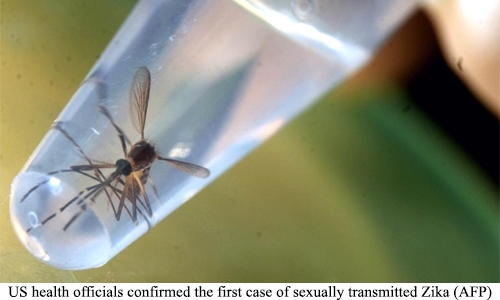First Zika death reported in Colombia
The mosquito-borne Zika virus sweeping through Latin America has claimed three lives in Colombia, as the United Nations urged increased access to abortion because of fears of severe birth defects.
In the first direct statements from government health officials blaming Zika for causing deaths, Colombia's National Health Institute (INS) said Friday that the patients died after contracting the virus and developing a rare neurological disorder called Guillain-Barre syndrome.
Cases of the syndrome -- in which the immune system attacks the nervous system, causing weakness and sometimes paralysis -- have increased in tandem with the Zika outbreak, fueling suspicions that it is a complication of the otherwise mild tropical fever, which is also blamed for causing brain damage in babies born to infected mothers.
"Other cases (of deaths linked to Zika) are going to emerge," said epidemiologist Martha Lucia Ospina, director of the INS.
"The world is realizing that Zika can be deadly. The mortality rate is not very high, but it can be deadly."
Most Guillain-Barre patients recover, but the syndrome sometimes causes paralysis or even death.
Citing the rise in babies born with microcephaly, or abnormally small heads and brains, the UN human rights office urged countries hit by Zika to give women access to contraception and abortion.
Women's reproductive rights are a touchy subject in largely Catholic Latin America, but the UN human rights office said countries urging women to avoid pregnancy -- a list that comprises Colombia, Ecuador, El Salvador, Jamaica and Panama -- had to give them ways to control their fertility.
"How can they ask these women not to become pregnant, but not offer... the possibility to stop their pregnancies?" spokeswoman Cecile Pouilly told reporters.
Many Latin American countries outlaw abortion or allow it only if the mother's life is in danger. In El Salvador, one of those warning against pregnancy, abortion is punishable by up to 40 years in prison.
Honduras, which earlier this week declared a state of emergency after tallying some 3,700 cases of Zika since mid-December, said it is planning a full day dedicated to eradicating the mosquitoes that carry the virus.
President Juan Orlando Hernandez has allocated an initial tranche of $10 million in an attempt to halt the spread of the virus.
Health officials in Brazil and the United States meanwhile warned that sex or even kissing could potentially spread the typically mosquito-borne disease.
Brazil's top research center, the Fiocruz institute in Rio de Janeiro, said Zika had been detected in urine and saliva.
The scientists were careful to clarify that there is no proof the virus can be transmitted through those fluids, but said people should take precautions, especially expecting mothers.
"Avoid sharing glasses, silverware, contact with someone who has symptoms of a possible infection. Don't kiss, obviously," said the institute's director Paulo Gadelha.
The US Centers for Disease Control (CDC) for their part urged people to use condoms or abstain from having sex if they live in or have traveled to Zika-infected areas.
Earlier this week, US health officials confirmed the first case of sexually transmitted Zika -- a person who had traveled to Venezuela and infected a partner in Texas upon return.
In the US territory of Puerto Rico, officials declared a health emergency over Zika and confirmed a pregnant woman had been infected, bringing the number of cases on the island to 22.
The emergency measures included freezing the price of condoms and combatting mosquitoes.
Related Posts

